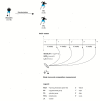The Effects of Long-Term Magnesium Creatine Chelate Supplementation on Repeated Sprint Ability (RAST) in Elite Soccer Players
- PMID: 32998206
- PMCID: PMC7600931
- DOI: 10.3390/nu12102961
The Effects of Long-Term Magnesium Creatine Chelate Supplementation on Repeated Sprint Ability (RAST) in Elite Soccer Players
Abstract
Aim: The aim of the study was to evaluate the effects of 16 weeks of a low dose of magnesium creatine chelate supplementation on repeated sprint ability test (RAST) results in elite soccer players.
Materials: Twenty well-trained soccer players participated in the study. The players were divided randomly into two groups: the supplemented group (SG = 10) and placebo group (PG = 10). Out of the 20 subjects selected for the study, 16 (SG = 8, PG = 8) completed the entire experiment. The SG ingested a single dose of 5500 mg of magnesium creatine chelate (MgCr-C), in 4 capsules per day, which was 0.07 g/kg/d. The PG received an identical 4 capsules containing corn starch. Before and after the study, the RAST was performed. In the RAST, total time (TT), first and sixth 35 m sprint length (s), average power (AP) and max power (MP) were measured. Additionally, before and after the test, lactate LA (mmol/L) and acid-base equilibrium pH (-log(H+)), bicarbonates HCO3- (mmol/L) were evaluated. Also, in serum at rest, creatinine (mg/dL) concentration was measured.
Results: After the study, significantly better results in TT, AP and MP were observed in the SG. No significant changes in the RAST results were observed in the PG. After the study, significant changes in the first 35 m sprint, as well as the sixth 35 m sprint results were registered in the SG, while insignificant changes occurred in the PG. A significantly higher creatinine concentration was observed. Also, a higher post-RAST concentration of LA, HCO3- and lower values of pH were observed in April, May and June compared with baseline values.
Conclusions: The long timeframe, i.e., 16 weeks, of the low dose of magnesium creatine chelate supplementation improved the RAST results in the SG. Despite the long period of MgCr-C supplementation, in the end of the study, the creatinine level in the SG reached higher but still reference values.
Keywords: RAST; anaerobic performance; creatine; soccer.
Conflict of interest statement
The authors declare no conflict of interest.
Figures
Similar articles
-
Chronic Ingestion of Sodium and Potassium Bicarbonate, with Potassium, Magnesium and Calcium Citrate Improves Anaerobic Performance in Elite Soccer Players.Nutrients. 2018 Nov 1;10(11):1610. doi: 10.3390/nu10111610. Nutrients. 2018. PMID: 30388775 Free PMC article.
-
Influence of Sunlight and Oral D3 Supplementation on Serum 25(OH)D Concentration and Exercise Performance in Elite Soccer Players.Nutrients. 2020 May 4;12(5):1311. doi: 10.3390/nu12051311. Nutrients. 2020. PMID: 32375348 Free PMC article.
-
Effects of creatine supplementation on oxidative stress and inflammatory markers after repeated-sprint exercise in humans.Nutrition. 2013 Sep;29(9):1127-32. doi: 10.1016/j.nut.2013.03.003. Epub 2013 Jun 22. Nutrition. 2013. PMID: 23800565 Clinical Trial.
-
Effects of Creatine Supplementation on Athletic Performance in Soccer Players: A Systematic Review and Meta-Analysis.Nutrients. 2019 Mar 31;11(4):757. doi: 10.3390/nu11040757. Nutrients. 2019. PMID: 30935142 Free PMC article.
-
Dietary and Ergogenic Supplementation to Improve Elite Soccer Players' Performance.Ann Nutr Metab. 2021;77(4):197-203. doi: 10.1159/000516397. Epub 2021 Jun 11. Ann Nutr Metab. 2021. Retraction in: Ann Nutr Metab. 2024;80(3):171. doi: 10.1159/000538351. PMID: 34120108 Retracted. Review.
Cited by
-
The relationships of serum vitamin D concentration with linear speed and change of direction performance in soccer players.Front Nutr. 2024 Nov 22;11:1501643. doi: 10.3389/fnut.2024.1501643. eCollection 2024. Front Nutr. 2024. PMID: 39650712 Free PMC article.
-
Effects of dietary supplements on athletic performance in elite soccer players: a systematic review.J Int Soc Sports Nutr. 2023 Dec;20(1):2236060. doi: 10.1080/15502783.2023.2236060. J Int Soc Sports Nutr. 2023. PMID: 37462346 Free PMC article.
-
Analysis of the efficacy, safety, and cost of alternative forms of creatine available for purchase on Amazon.com: are label claims supported by science?Heliyon. 2022 Dec 6;8(12):e12113. doi: 10.1016/j.heliyon.2022.e12113. eCollection 2022 Dec. Heliyon. 2022. PMID: 36544833 Free PMC article.
-
Supplement Consumption by Elite Soccer Players: Differences by Competitive Level, Playing Position, and Sex.Healthcare (Basel). 2024 Feb 19;12(4):496. doi: 10.3390/healthcare12040496. Healthcare (Basel). 2024. PMID: 38391871 Free PMC article.
-
Effects of short bout small-sided game training on acid-based balance markers in youth male soccer players.Sci Rep. 2023 Mar 2;13(1):3510. doi: 10.1038/s41598-023-30646-4. Sci Rep. 2023. PMID: 36864165 Free PMC article.
References
-
- Zajac A., Waskiewicz Z., Poprzecki S., Cholewa J. Effects of creatine and HMß supplementation on anaerobic power and body composition in basketball players. J. Hum. Kinet. 2003;10:95–108.
-
- Kreider R., Kalman D., Antonio J., Ziegenfuss T.M., Wildman R., Collins C., Candow D.G., Kleiner S.M., Almada A.L., Lopez H.L. International Society of Sports Nutrition position stand: Safety and efficacy of creatine supplementation in exercise, sport, and medicine. J. Int. Soc. Sports Nutr. 2017;14:18. doi: 10.1186/s12970-017-0173-z. - DOI - PMC - PubMed
-
- Kreider R.B., Jung Y.P. Creatine supplementation in exercise, sport, and medicine. J. Exerc. Nutr. Biochem. 2011;15:53–69. doi: 10.5717/jenb.2011.15.2.53. - DOI
Publication types
MeSH terms
Substances
LinkOut - more resources
Full Text Sources
Medical
Miscellaneous



